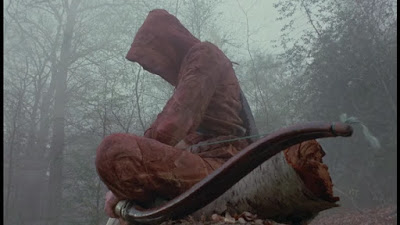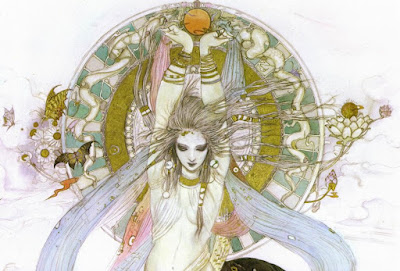Whenever I talk with new school D&D players about B/X, the biggest sticking point for them is always race-as-class. That’s understandable. It’s a big departure from what they’re used to. I like race-as-class; in an assumed human-centric world, it gives the sense that demihumans are thoroughly distinct.
The special thing about fighter PCs is that they’re good at combat. The special thing about thief PCs is that they’re sneaky and have a bunch of thief-type skills. The special thing about an elf PC is that it’s an elf. To someone who likes a level of normalcy in their campaign so that the weird has room to be weird, that’s enough.
In 5e an elf has more in common with a human or a dwarf if they happen to be fighters than another elf if that elf happens to be a bard or druid. That doesn’t sit right with me.
Hawk the Slayer didn’t assemble a team of five generic fighter PCs. He gathered an elf, a dwarf, a giant, and that other guy. The variety of fantasy races represented was what made them interesting. I just saw Hawk the Slayer by the way. Terrific movie.
With all that being said, more variety among the demihuman races is not always bad. The Adventurer, Conqueror, King System and this post from the esteemed Dr. Jeff Rients posit that demihumans ought to have their own classes exclusive to their respective race. It’s an intriguing idea, and while I’m not particularly crazy about ACKS’s execution (no disrespect to the system; I’m just physically incapable of being interested in anything called an “elven nightblade”) it’s a solid enough idea that I was inspired to take a stab at it myself.
Early on in the conceptual stage, I realized that the unique features that characterize the demihuman classes, like the dwarf’s ability to recognize architectural quirks or the elf’s immunity to ghoul paralysis, are rather easy to replicate and play around with. Instead of coming up with distinct classes for each demihuman, it was much easier and facilitated more creativity to come up with variations of the same classes. And this has the added benefit of keeping demihuman classes more thematically cohesive. You maintain that thing I brought up earlier where the special thing about an elf PC is still that they’re an elf—not an elven shardwhisperer (or whatever).
 |
| "A strange individual, to be sure..." |
All elves have infravision and a 2:6 chance of hearing noises.
 Fair elf. You are from some bizarre elf city, like a floating kingdom or domed arcology. Fair elves are haughty and gracile, and more often than not spend the majority of their lives far removed from the concerns of human civilizations. Fair elves that leave their society typically do so as part of (or to avoid) some inscrutably complex social or political circumstance in their homeland, or simply to accumulate novel experiences that add texture to their long existence.
Fair elf. You are from some bizarre elf city, like a floating kingdom or domed arcology. Fair elves are haughty and gracile, and more often than not spend the majority of their lives far removed from the concerns of human civilizations. Fair elves that leave their society typically do so as part of (or to avoid) some inscrutably complex social or political circumstance in their homeland, or simply to accumulate novel experiences that add texture to their long existence.
Immune to ghoul paralysis. 2:6 chance to find secret doors.
Fair elf PCs have a 2:6 chance of having their starting weapons and armor be of quality elven make, meaning they have equal durability though half the weight of standard equipment. Roll only after purchasing gear at character creation.
Sylvan elf. You hail from a massive, primeval forest as yet untouched by man. Sylvan elves eschew civilization in favor of small nomadic communities. They are generally aloof, capricious, and fascinated by human customs though they have little regard to adhering to social strictures.
Animals can understand you. Immune to charming spells and creature effects such as that of a dryad or nixies. Climb and Move Silently 4:6 when in the wilderness.
Sylvan elf PCs have a 2:6 chance of starting with an animal companion from their homeland.
- Elephant bird. Stats as draft horse.
- Royal stag. Stats as riding horse.
- Dire lynx. Stats as war horse.
- Cooshee (elven hound). Stats as wolf. Their bark can be heard a mile away, which they use to warn their master of danger.
The animal companions are smarter than their mundane counterparts and will obey your commands to the best of their ability. They are entirely faithful and never break morale. You only get one though, so if your companion dies that's it.
Sanguine elf. You are an exile from the Vermilion Isles. The demon-worshipping sanguine elves shun all others and seclude themselves in remote island kingdoms as the ages roll past outside. Millenia of decadence and isolation have led them to pursue ever more baroque and horrifying forms of supernatural hedonism.
Alignment must be Chaotic. Drugs and other non-magical mind-altering substances require twice the effective dose to work on you. Immune to level drain. 2:6 chance to detect enchanted creatures in a 10’/level radius. Successfully detecting an enchanted creature grants you insight into their nature (demon, elemental, undead, etc.) but no specific details about their identity or intention.
Sanguine elf PCs have a 1:6 chance (rolled on a 1) of being a cenobite: your Charisma is reduced to 2 and you are generally disdained by all, but you can only be killed by magical attacks. Anything mundane that would normally kill you instead drops your hp to 1, knocks you out for a turn, and reduces your total HD by 1 (your level stays the same). Grotesque ritual mutilations are both among the greatest gifts and harshest punishments of the Vermilion Isles.
Sanguine elf PCs also have a 1:6 chance (rolled on a 6) of being a member of the ruling bloodline. Once per level, you can call upon a demonic benefactor to assist you in a time of need—a "Get Out of Jail Free card" for any sticky situation you and your allies might find yourselves in. The demon's help is rarely given for free; Oftentimes, they require an offering in exchange, or a favor to be claimed at a later date...
Dawnlander elf. You are from—or claim to be from—the mythic Dawnlands, a Shangri La-like place spoken of in legend. Dawnlander elves are active and adventurous, eager to live and work among humans but never staying in one place for too long. They are often drawn to the sea, and typically find success in the more exciting seafaring ventures like whaling and piracy.
Immune to diseases both mundane and supernatural. 2:6 chance to detect room traps or other unseen dangers in a 10’x10’ area.
Dawnlander PCs have a 2:6 chance of starting as a pirate. Roll up your old pirate crew, see the pirate statblock. You don't know where exactly the treasure's buried, but you know your old captain has the map. You're familiar with (and perhaps have a reputation at) the major pirate havens.
Boreal elf. You hail from the frigid northlands. To outsiders, it appears that the stoic and severe boreal elves lead sparse lives, cloistered monk-like in their icy strongholds. But in reality, your kind has a remarkably complex societal structure filled with all sorts of particular customs and rituals that are entirely lost on outsiders. The boreal elves have the reputation of crafting heartbreakingly beautiful objets d'art, which are coveted the world over by men and elves alike.
Immune to the effects of cold, both mundane and supernatural. Boreal elves possess the Boreal Aura: a supernatural ambiance that can be manipulated to function as psionics. You start with two psionic powers, and your power dice is improved one step (1d4 becomes 1d6, 1d6 becomes 1d8, and so on). Any time you were to suffer a breakdown, you suffer a shock instead. You learn magic as though you were one level below.
Boreal elf PCs have a 2:6 chance of being trained in the grueling spiritual practice of their kind. Through discipline, breath control, and aura manipulation, you have total control of your body temperature and heart rate, can maintain balance in virtually any position, hold a single pose indefinitely, walk on your fingertips, sense the aura of other living creatures (only surprised on a 1:6), snag projectiles out of the air (1/round, must have a hand free), and explore dungeons or travel the wilderness tirelessly without the need for rest. In order to benefit from these features, the PC must engage in intense meditation that leaves you unable to memorize spells for the day.
Lunar elf. You are from the moon. Lunar elves are eerie and ethereal, often quiet and prone to bouts of reverie. Their detached yet dignified mannerisms and strange appearance (platinum or silverwhite hair, eyes, and skin that seem to glow faintly in the dark) make them the most alien of all the elves, though it can be said their proclivities lend them an unmistakable mystique.
Immune to sleep spells. In place of sleeping, lunar elves enter a dreamlike trance that leaves them semi-conscious yet oblivious to their surroundings. Begin with an extra first-level spell. Once per day, a lunar elf can exchange a memorized spell to cast any 1st level cleric spell.
Lunar elf PCs have a 2:6 chance of having an important relationship with an etheric lunar entity. Under the light of a full moon, you can enter a trance to commune with this entity. During the trance, you can ask 1d4 questions and receive truthful though not necessarily specific answers. The entity knows much, but is not generally concerned with the affairs of mortals and so will not be able to provide answers on specific individuals, local politics, or recent events. After communing with the entity, you must spend an entire day resting.
And a bonus elf, available only to players who have run an elf PC to 4th level.
Shadow elf. You are from the Plane of Shadows. Little is known about shadow elves, other than that most seem to reside in the eternally twilit forests of the shadow realm. How or why one would make their way to this world is unknown. You certainly won’t get an answer out of them. Human scholars believe shadow elves to be one of the many living permutations of shadow planes' id. Elves believe that each shadow elf is an umbral counterpart of an elf that lives in the prime material plane. While the two may never meet, they share an inextricable bond that transmits vague impressions between dimensions.
Immune to shadows’ strength drain. 90% chance to hide in shadows or move silently provided dim light or darkness. Access to the Illusionist spell list. Shadow elves cannot recruit hirelings or construct strongholds.
Up Next: Dwarves.









No comments:
Post a Comment